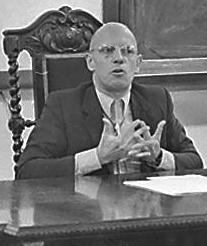Michel Foucault frasi celebri
da Michel Foucault, un'intervista: il sesso, il potere e la politica dell'identità, in Archivio Foucault. Interventi, colloqui, interviste, a cura di Alessandro Pandolfi, traduzione di Sabina Loriga, Feltrinelli, Milano, 1996, vol. III
da Malattia mentale e psicologia, traduzione di F. Polidori, Cortina Raffaello, 1997
Frasi sulla pazzia di Michel Foucault
“Dall'uomo al vero uomo, la strada passa per l'uomo pazzo.”
da Storia della follia nell'età classica
Variante: Dall'uomo all'uomo vero, il cammino passa attraverso l'uomo folle.
“Non esiste una sola cultura al mondo in cui sia permesso di fare tutto.”
appendice La follia, l'assenza di opera, p. 478
Storia della follia nell'età classica
Origine: Storia della follia nell'età classica, p. 607
Michel Foucault Frasi e Citazioni
pag. 58
Storia della follia nell'età classica
da Due risposte sull'epistemologia, traduzione di A. Fontana, Lampugni Nigri, Milano, 1971
“La libertà di coscienza comporta più rischi dell'autorità e del dispotismo.”
2012
Storia della follia nell'età classica
da Perché studiare il potere: la questione del soggetto, traduzione di Roberto Cagliero, revisione di Marcella Pogatschnig, in Poteri e strategie, a cura di P. Dalla Vigna, Mimesis Edizioni, 1994
da Potere-corpo, in Microfisica del potere: interventi politici, a cura di Alessandro Fontana, Pasquale Pasquino, traduzione di Giovanna Procacci, Einaudi, 1982<sup>4</sup>
da La volontà di sapere, traduzione di Pasquale Pasquino e Giovanna Procacci, Feltrinelli, 1978, pp. 116-7
da Sorvegliare e punire; citato in la Repubblica, 8 febbraio 2008
da «Io sono un artificiere», giugno 1975, in Conversazioni. Interviste di Roger-Pol Droit, a cura di Fabio Polidori, Mimesis Edizioni, 2007
pag. 53
Storia della follia nell'età classica
pag. 84
Storia della follia nell'età classica
da Tecnologie del sé. Un seminario con Michel Foucault, a cura di Luther H. Martin, Huck Gutman, Patrick H. Hutton, traduzione di Saverio Marchignoli, Boringhieri, Torino, 1992, p. 23
The Lives of Michel Foucault: a Biography, di David Macey, Vintage Editions 1995
Michel Foucault: Frasi in inglese
Part Four, Complete and austere institutions
Discipline and Punish (1977)
Discipline and Punish (1977) as translated by Alan Sheridan, p. 228
Discipline and Punish (1977)
Truth, Power, Self : An Interview with Michel Foucault (25 October 1982)
Origine: Discipline and Punish (1977), Chapter One, pp. 56
Truth, Power, Self : An Interview with Michel Foucault (25 October 1982)
“How to define the moment that I write?”
Qui définit le moment où j'écris?
"Un cours inedit" in Magazine littéraire (May 1984), page 34.
Vol. I, p. 59
History of Sexuality (1976–1984)
Part One: 1. Stultifera Navis
History of Madness (1961)
Part One: 1. Stultifera Navis
History of Madness (1961)
Origine: Discipline and Punish (1977), Chapter One, The Spectacle of the Scaffold
Part Two: 2. The Transcendence of Delirium
History of Madness (1961)
“Technologies of the Self,” Ethics, Subjectivity and Truth (1994), p. 228
L’important, c’est que le sexe n’ait pas été seulement affaire de sensation et de plaisir, de loi ou d’interdiction, mais aussi de vrai et de faux.
Vol. I, p. 76
History of Sexuality (1976–1984)
Origine: Discipline and Punish (1977), Chapter One: The Spectacle of the scaffold, pp. 67
Lecture 8 (1 March 1978), p. 195
Security, Population, Territory (1978)
Preface
The Order of Things: An Archaeology of the Human Sciences (1970)
"Power, Moral Values, and the Intellectual", interview in History of the Present 4 (Spring 1988)
What is Enlightenment? (1978)
Origine: Discipline and Punish (1977), Chapter Two, pp.80
Origine: Discipline and Punish (1977), Chapter Three, The Gentle Way in Punishment
As quoted in Who's Who in Contemporary Gay & Lesbian History: From World War II to the Present Day (2001) by Robert Aldrich and Gary Wotherspoon ISBN 041522974X
Origine: Discipline and Punish (1977), Chapter One, pp.55
Origine: Discipline and Punish (1977), Chapter One, The body of the condemned, pp.23
Preface to 1961 edition
History of Madness (1961)
Origine: Discipline and Punish (1977), Chapter Three, The Gentle Way in Punishment
Foreword to the English edition
The Order of Things: An Archaeology of the Human Sciences (1970)
